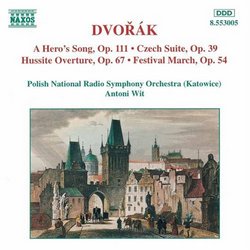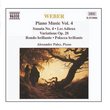| All Artists: Antonin Dvorak, Antoni Wit, Polish Radio Orchestra & Chorus Katowice, Polish Radio Symphony Orchestra Title: Dvorák: A Hero's Song; Czech Suite; Hussite Overture; Festival March Members Wishing: 0 Total Copies: 0 Label: Naxos Release Date: 3/21/1995 Genres: Special Interest, Classical Styles: Marches, Forms & Genres, Symphonies, Theatrical, Incidental & Program Music Number of Discs: 1 SwapaCD Credits: 1 UPC: 730099400527 |
Search - Antonin Dvorak, Antoni Wit, Polish Radio Orchestra & Chorus Katowice :: Dvorák: A Hero's Song; Czech Suite; Hussite Overture; Festival March
 | Antonin Dvorak, Antoni Wit, Polish Radio Orchestra & Chorus Katowice Dvorák: A Hero's Song; Czech Suite; Hussite Overture; Festival March Genres: Special Interest, Classical
|
Larger Image |
CD DetailsSimilar CDs
|
CD ReviewsBeautifully refined performances throughout. Mike Powers | Woolwich, ME USA | 07/04/2000 (5 out of 5 stars) "I found this CD an absolute delight! From opening to closing measure of each piece, the Polish National Radio Symphony Orchestra, conducted by Antoni Wit, give beautifully refined and idiomatic performances. Tempi tend to be little more laid back than in other versions I've heard, but this more than compensated for by the nicely rustic, Slavonic character with which the music is played. The CD's sound is superb throughout, aided greatly by the warm and resonant acoustics of the Concert Hall of the Polish Radio, where this recording was made. Aficionados of Antonin Dvorak's music will find this a most enjoyable listening experience." A Gem for Dvorak Lovers Timothy Kearney | Hull, MA United States | 10/27/2004 (4 out of 5 stars) "Once again, Naxos does what Naxos does best: producing quality recordings at a budget price. In this collection we have four works of Dvorak, two of which are familiar and two which are not as well known. Each piece is quintessentially Dvorak. The symphonic poem "A Hero's Song" uses a musical style that Dvorak masters. According to the liner notes, some musicologists believe that Dvorak is the hero of the piece, confident in his skills as a musician in spite of obstacles and criticisms, remains loyal to his gift, and is ultimately triumphant. This is perhaps the strongest track of the recording, performed with a power and conviction fitting of such a work. "The Czech Suite" is probably the best known work of the recording. I have two other recordings of this piece, and prefer Antoni Wit's interpretation. He seems to be able to draw out the richness of the score, paces it well, and allows the listener to enjoy the Czech flavor of the music. "The Hussite Overture" and the well known "Festival March complete the recording. Musically these two works are not as sophisticated as the first two tracks, but both are performed well. As with many Naxos recordings, the conductor and orchestra are not instantly recognizable musicians, but lack of familiarity does not mean mediocrity. Both the conductor (Antoni Wit) and the Orchestra (The Polish National Radio Symphony Orchestra) seem at home with the music of Dvorak and the result is a very pleasing recording. " A Useful Dvorak Miscellany M. C. Passarella | Lawrenceville, GA | 12/27/2007 (4 out of 5 stars) "If, as critics surmise, "A Hero's Song" is an autobiographical statement by Dvorak, then it is a less bombastic "Ein Heldenleben" and without the love interest; at least I don't hear any love music in Dvorak's piece. Like Strauss's tone poem, it ambles a bit, even shambles a bit, and is longer than it really needs to be. The last triumphant section, in which the eponymous hero wins out over disappointment and adversity, is the least involving, its theme and treatment being surprisingly bland for Dvorak this late in his career (1897). But the early pages of the work are tensely dramatic and worth hearing, even if this is a work you won't return to terribly often. It is given a big-boned, imposing reading by the reliable Antoni Wit and his fine orchestra, and the Naxos engineers capture the performance on a breathtakingly wide soundstage that adds to the drama.
This approach works much less well for the more familiar Czech Suite, one of Dvorak's most delectable scores. Wit's performance is a good one, but the acoustic works against him. This music impresses much more with smaller forces (a chamber orchestra is sufficient) and a less churchy ambience. However, the other works, especially Dvorak's thrilling "Hussite Overture," with its references to traditional Bohemian hymns that Smetana used in his "Ma Vlast," make good companion pieces, carrying through the air of festivity and triumph with which "A Hero's Song" concludes. These pieces are very capably done as well and successfully complete a disc that, on points, would be a useful addition to your Dvorak collection." |

 Track Listings (8) - Disc #1
Track Listings (8) - Disc #1
